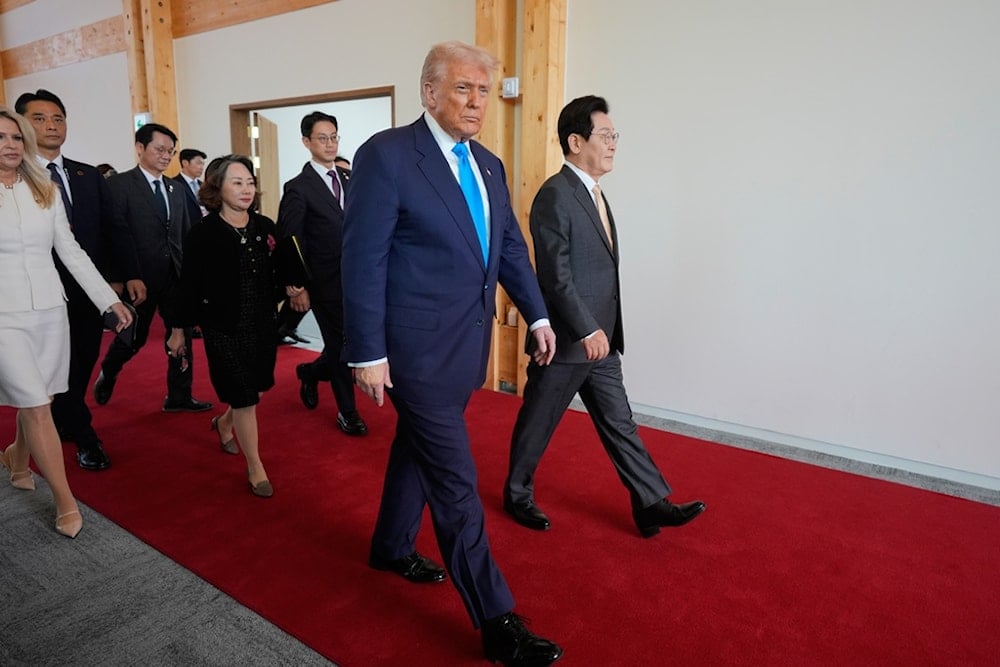Trump's Asia tour targets trade deals with South Korea, China
US President Donald Trump advances trade talks with South Korea and China during his Asia tour, aiming to ease tariffs and strengthen economic ties.
-

US President Donald Trump, center, and South Korean President Lee Jae Myung, right, attend a high honor ceremony at the Gyeongju National Museum in Gyoeongju, South Korea, Wednesday, October 29, 2025. (AP Photo/Mark Schiefelbein)
US President Donald Trump began the final leg of his Asia tour in South Korea on Wednesday, expressing optimism about reaching a truce in the ongoing trade war with Chinese President Xi Jinping and making progress on a stalled tariff deal with South Korean President Lee Jae Myung.
Trump arrived from Tokyo just hours after the DPRK tested a nuclear-capable cruise missile. He is set to meet Lee in Gyeongju, the host city for this year’s Asia-Pacific Economic Cooperation (APEC) forum, ahead of high-level discussions with Xi on Thursday.
Speaking to reporters aboard Air Force One, Trump stated his focus was not on to be on the DPRK missile test, but rather on advancing US-China trade discussions.
"The relationship with China is very good. So I think we're going to have a very good outcome for our country and for the world, actually," Trump stated.
Trump expects to reduce US tariffs on Chinese goods in return for Beijing’s pledge to restrict the export of precursor chemicals used in the production of fentanyl. According to the Wall Street Journal, the United States could slash the current 20% levies in half as part of the deal.
Read more: Trump, Takaichi sign rare earths deal to strengthen US-Japan alliance
Talks with South Korea’s Lee Jae Myung remain stalled
During his address to APEC CEOs in Gyeongju, Trump expressed confidence that a trade agreement with South Korea would be finalized "very soon". However, officials on both sides have cast doubt on the likelihood of a breakthrough this week.
In July, both nations announced a preliminary deal that would exempt South Korea from some US tariffs in exchange for $350 billion in new investments into the United States. Since then, negotiations have been deadlocked over how the investments will be structured.
Trump has also urged allies like South Korea to increase defense spending. Meanwhile, Seoul has pushed for reforms to US immigration laws to accommodate more South Korean workers after a raid on a Hyundai Motor battery plant in Georgia.
The two leaders are expected to discuss trade, investment, and the broader peace process on the Korean peninsula, Lee’s office said.
Trump has repeatedly called for a meeting with DPRK leader Kim Jong Un, including during this trip. However, Pyongyang has not publicly responded, and the DPRK president has previously indicated willingness to engage in dialogue if Washington ceases its pressure campaign aimed at denuclearization.
During their working lunch, Lee is expected to present Trump with a replica gold crown and award him the "Grand Order of Mugunghwa", South Korea’s highest honor. A “golden dessert” is also reportedly on the menu.
Earlier in the day, Trump received a red-carpet welcome in Busan, complete with a cannon salute and a brass band performance of YMCA, a staple at his political rallies.
Read more: South Korea's Lee dodges 'Zelensky moment' at Trump meeting
Key meeting with Xi Jinping expected to shape US-China trade
Trump is skipping the main APEC summit but plans to hold bilateral meetings with several regional leaders, including Xi, before departing on Thursday.
US officials said that negotiators from both countries reached a tentative framework on Sunday aimed at pausing the implementation of new US tariffs and China's restrictions on rare earths exports, developments that led to a stock market surge.
Trump indicated that talks with Xi will also cover Nvidia’s Blackwell AI chips, whose sales to China have become a central issue in bilateral trade tensions.
Since returning to office in January, Trump has fluctuated in his position on Taiwan, which China claims as part of its territory in according with the One-China Policy, which the US has consistently undermined over the past decades. He has claimed that Xi assured him there would be no military action against Taiwan during Trump’s term, and that no new US arms deals for Taipei have been announced.
Taiwan's Foreign Minister Lin Chia-lung said Tuesday he does not believe Trump would "abandon" the island in his talks with Xi. In contrast, Beijing reiterated on Wednesday that it "absolutely will not" rule out using force over Taiwan.
Trump told reporters he was unsure whether Taiwan would be addressed in his upcoming meeting with Xi.
Read more: Trump rules out vice presidency bid in 2028
Recap of Trump’s Asia tour: Japan, Malaysia, and beyond
Trump’s stop in South Korea marks the final leg of his regional tour, which has focused heavily on trade realignments and security issues.
In Malaysia, he oversaw the signing of new trade agreements and welcomed a peace truce between Thailand and Cambodia following a border dispute.
In Tokyo, Trump praised Japan’s first female Prime Minister, Sanae Takaichi, for her commitment to military expansion. The United States and Japan also finalized a range of trade and rare earth agreements, with Tokyo pledging $550 billion in strategic US investments, loans, and guarantees in exchange for tariff relief.
Washington has sought a similar arrangement with South Korea. However, Seoul has stated it cannot front the full $350 billion and instead proposed phased investments, loans, and related measures.
South Korean Foreign Minister Cho Hyun said on Tuesday that a last-minute US concession might pave the way to a finalized deal.
Read more: China’s industrial profits surge as Beijing tackles on overcapacity

 5 Min Read
5 Min Read










